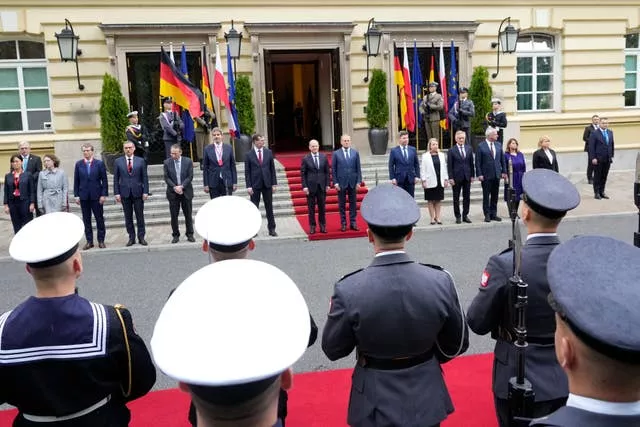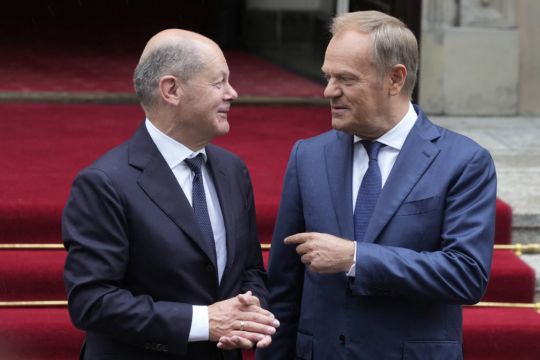Government leaders of Poland and Germany held wide bilateral consultations aimed at giving a new impulse to neighbourly relations that sagged under Poland’s previous government, and to jointly declare responsibility for Europe’s security in turbulent times.
German Chancellor Olaf Scholz travelled with 12 ministers and government members, including Defence Minister Boris Pistorius, for the meeting in Warsaw on Tuesday.
“We bring a very clear message: Germany and Poland are good neighbours, close partners and reliable friends. And we want to create a new dynamic for our cooperation,” Mr Scholz told a joint news conference with Mr Tusk.

He stressed that “close partnership between Germany and Poland is very important to us”.
The two pro-European leaders were tightening ties at a time when support is surging in Europe for eurosceptic far-right parties and days after a first round of parliamentary elections in France brought the far right there closer than ever to government.
Wide bilateral consultations between Germany and Poland were most recently held in November 2018.
After that, Poland’s right-wing government that was in power until last year adopted a hostile attitude toward Berlin, accusing Germany of excessive influence on European Union decision-making, and focusing on demanding some 1.3 trillion dollars in reparations for the losses that Nazi German occupation caused Poland during the Second World War.
Mr Tusk’s government, which took office in December, is taking steps to mend the ties.
They gained special significance in the face of Russia’s war on Ukraine, just across Poland’s and the 27-member EU’s eastern border, and pressure of irregular migration from the Middle East and Africa, which Poland and the EU say is a part of Russia’s and ally Belarus’ hybrid war on Europe.

Mr Tusk, a former EU Council head, said that Poland’s and the continent’s security was his priority and that “no one should have any doubts as to the importance of good cooperation in this area between Poland and Germany”.
Mr Tusk said it was with great satisfaction that he heard Mr Scholz’s declaration that Germany is ready to take co-responsibility for the security of Poland’s eastern border, through investment into the infrastructure and other security needs there.
He criticised European countries for lacking coordination and determination in taking steps for the continent’s joint security.
“The security of Germany and Poland is inextricably linked. This means that Poland’s security is also Germany’s security,” Mr Scholz said.
“This is what we stand for as neighbours, as Nato allies and as partners in the European Union.”
“Our solidarity and our joint action are our common strength,” he added.
Mr Scholz also pledged to “take measures to support the surviving victims of the German attack and occupation in the years 1939-45” in Poland and to “strengthen remembrance and commemoration of our painful shared history” by commemorating the Polish victims through the establishment of a German-Polish House that is “intended to be a visible sign against forgetting and a warning for the future”.







